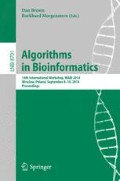Abstract
In applications where a collection of similar sequences needs to be amplified through PCR, degenerate primers can be used to improve the efficiency and accuracy of amplification. Conceptually, a degenerate primer is a sequence in which some bases are ambiguous, in the sense that they can bind to more than one nucleotide. These ambiguous bases allow degenerate primers to bind to multiple target sequences. When designing degenerate primers, it is essential to find a good balance between high coverage (the number of amplified target sequences) and low degeneracy. In this paper, we propose a new heuristic, called RRD2P, for computing a pair of forward and reverse primers with near-optimal coverage, under the specified degeneracy threshold. The fundamental idea of our algorithm is to represent computing optimal primers as an integer linear program, solve its fractional relaxation, and then apply randomized rounding to compute an integral solution. We tested Algorithm RRD2P on three biological data sets, and our experiments confirmed that it produces primer pairs with good coverage, comparing favorably with a similar tool called HYDEN.
Research supported by NSF grants CCF-1217314 and NIH 1R01AI078885.
Access this chapter
Tax calculation will be finalised at checkout
Purchases are for personal use only
Preview
Unable to display preview. Download preview PDF.
References
Kwok, S., Chang, S., Sninsky, J., Wang, A.: A guide to the design and use of mismatched and degenerate primers. PCR Methods and Applications 47, S39–S47 (1994)
Hunt, D.E., Klepac-Ceraj, V., Acinas, S.G., Gautier, C., Bertilsson, S., Polz, M.F.: Evaluation of 23s rRNA PCR primers for use in phylogenetic studies of bacterial diversity. Applied Environmental Microbiology 72, 2221–2225 (2006)
Ihrmark, K., Bödeker, I.T., Cruz-Martinez, K., Friberg, H., Kubartova, A., Schenck, J., Strid, Y., Stenlid, J., Brandström-Durling, M., Clemmensen, K.E., Lindahl, B.D.: New primers to amplify the fungal its2 region–evaluation by 454-sequencing of artificial and natural communities. FEMS Microbiology Ecology 82, 666–677 (2012)
Chamberlain, J.S., Gibbs, R.A., Rainer, J.E., Nguyen, P.N., Casey, C.T.: Deletion screening of the duchenne muscular dystrophy locus via multiplex dna amplification. Nucleic Acid Research 16, 11141–11156 (1988)
Konwar, K.M., Mandoiu, I.I., Russell, A.C., Shvartsman, A.A.: Improved algorithms for multiplex PCR primer set selection with amplification length constraints. In: Proc. 3rd Asia-Pacific Bioinformatics Conference, pp. 41–50 (2005)
Linhart, C., Shamir, R.: The degenerate primer design problem: theory and applications. Journal of Computational Biology 12(4), 431–456 (2005)
Linhart, C., Shamir, R.: The degenerate primer design problem. Bioinformatics 180, S172–S180 (2002)
Souvenir, R., Buhler, J.P., Stormo, G., Zhang, W.: Selecting degenerate multiplex PCR primers. In: Benson, G., Page, R.D.M. (eds.) WABI 2003. LNCS (LNBI), vol. 2812, pp. 512–526. Springer, Heidelberg (2003)
Balla, S., Rajasekaran, S.: An efficient algorithm for minimum degeneracy primer selection. IEEE Transactions on NanoBioscience 6, 12–17 (2007)
Sharma, D., Balla, S., Rajasekaran, S., DiGirolamo, N.: Degenerate primer selection algorithms. Computational Intelligence in Bioinformatics and Computational Biology, 155–162 (2009)
Duitama, J., Kumar, D.M., Hemphill, E., Khan, M., Mandoiu, I.I., Nelson, C.E.: Primerhunter: a primer design tool for PCR-based virus subtype identification. Nucleic Acids Research 37, 2483–2492 (2009)
http://dna.engr.uconn.edu/software/PrimerHunter/primerhunter.php
Boyce, R., Chilana, P., Rose, T.M.: iCODEHOP: a new interactive program for designing COnsensus-DEgenerate Hybrid Oligonucleotide Primers from multiply aligned protein sequences. Nucleid Acids Research 37, 222–228 (2009)
Huang, Y.T., Yang, J.I., Chrobak, M., Borneman, J.: Prise2: Software for designing sequence-selective PCR primers and probes (2013) (in preparation)
Author information
Authors and Affiliations
Editor information
Editors and Affiliations
Rights and permissions
Copyright information
© 2014 Springer-Verlag Berlin Heidelberg
About this paper
Cite this paper
Huang, YT., Chrobak, M. (2014). An LP-Rounding Algorithm for Degenerate Primer Design. In: Brown, D., Morgenstern, B. (eds) Algorithms in Bioinformatics. WABI 2014. Lecture Notes in Computer Science(), vol 8701. Springer, Berlin, Heidelberg. https://doi.org/10.1007/978-3-662-44753-6_9
Download citation
DOI: https://doi.org/10.1007/978-3-662-44753-6_9
Publisher Name: Springer, Berlin, Heidelberg
Print ISBN: 978-3-662-44752-9
Online ISBN: 978-3-662-44753-6
eBook Packages: Computer ScienceComputer Science (R0)

